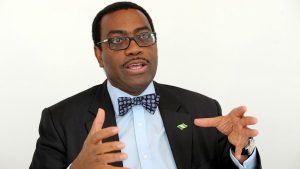By Charles Abuede
- Says 86 of Nigeria’s SMEs spend a whopping $14bn annually on diesel for generators
- Nigerian companies lose an average 10% of their sales due to inaccessible, unaffordable and reliable electricity
The president of the African Development Bank (AfDB), Akinwumi Adesina, has stated that profit shifting, base erosion and tax avoidance by multinational corporations form a huge part of Africa’s missing taxes and they account for a large share of the over $60 billion in illicit capital flows that Africa loses annually. He made this revelation on Thursday while delivering his speech at the FIRS First Tax Dialogue held by the FIRS in Abuja, Nigeria.
At the virtual event, the AfDB president stated that owing to the unavailability of proper and effective tax administration and transparency, Nigerians pay one of the highest implicit tax rates in the world, way higher than developed countries. He also stated that 86 per cent of small-sized medium enterprises in Nigeria spend a whopping $14 billion annually on diesel for generators and Nigerian companies lose an average of 10 per cent of their sales because they do not have access to affordable and reliable electricity.
“Truth be told, Nigerians pay one of the highest implicit tax rates in the world, way higher than developed countries. They provide electricity for themselves, our generators, they repair roads for their neighbourhoods, if they afford to. There are no social security systems, they provide security for their own safety and they provide boreholes for bringing water with their own monies; and that’s incredulous by itself.
“Boreholes are not the way to provide water in the 21st century. Every household should have pipe-borne water. For instance, 86 per cent of small-sized medium enterprises in Nigeria spend a whopping $14 billion annually on diesel for generators. Nigerian companies lose an average 10 per cent of their sales because they do not have access to affordable and reliable electricity,” he said.
Adesina, who was re-elected for the second time into the leadership of the continent’s largest development bank in 2020, highlighted ways in which Nigeria’s federal government, as well as the subnational government leaders, can further gaze focus on corporate taxes and ensure full compliance, while also ensuring that such taxes do not discourage investment in the country, noting that the method would allow corporations to reinvest their profits in expanding their businesses.
In his words: “Taxing corporate revenue instead of profits will discourage investments needed to grow businesses and to create jobs. Now, natural resources tax can play a major role in Nigeria. Given Nigeria’s high reliance on oil and gas and minerals, the government should ensure these sectors pay taxes and royalties that are fair and transparent.
“Tax policy can be used to incentivize the closing of the massive infrastructure gap that Africa faces, including Nigeria; and Nigeria is showing god example. The new initiative between the federal government and selected private sector businesses to provide road infrastructure in return for tax rebates is an excellent idea. It is conditional and it can be assessed and measured for delivery. That’s the kind of accountability needed so tax rebates and exemption are not abused,” Adesina stated.
Speaking on the need for good governance for effective tax administration in Nigeria, the AfDB boss said the businesses of creative and bubbling Nigerian youths should be incentivized to grow as they will become bigger businesses that can provide higher taxes over time.
“There is an urgent need for a fiscal policy regime that strongly supports businesses of young people in Nigeria. Your excellences, given Nigeria’s high level of poverty and huge inequality, taxes should not be regressive; where taxes paid on goods and services are the same regardless of income. But one thing we cannot ignore is good governance. Good governance is the speed dial for greater tax payments.
“The role of a government is not just to collect taxes but to ensure that taxes are collected transparently, used transparently and responsibly and that the citizens see what their taxes are being used for. While there should be tax obligations for citizens, there should also be tax accountability to citizens from the government. Participatory tax base financing demands participatory government,” he posited.
Furthermore, Adesina advised that efforts should be made to improve administration and, of course, optimal compliance. He said weaknesses in tax administration, complex tax codes cause leakages and are therefore costing governments to lose much needed revenues and resources for development. Also, tax legislations should be stable and predictable given Nigeria’s structure for the 3 tiers of government, noting that “efforts must be made to reform tax laws and institutional frameworks to avoid the multiplicity of taxes”.
He also emphasized that for a nation like Nigeria to succeed, efforts must be made to reform domestic tax laws and institutional frameworks that have more scopes that can improve the institutional capacities, tax orders, tax management, and business intelligence at all levels to improve tax revenue collection.
In the meantime, he said the AfDB is ready to provide the needed technical and institutional supports to the Federal Inland Revenue Service and to Nigeria to build up its capacity for tax administration.






